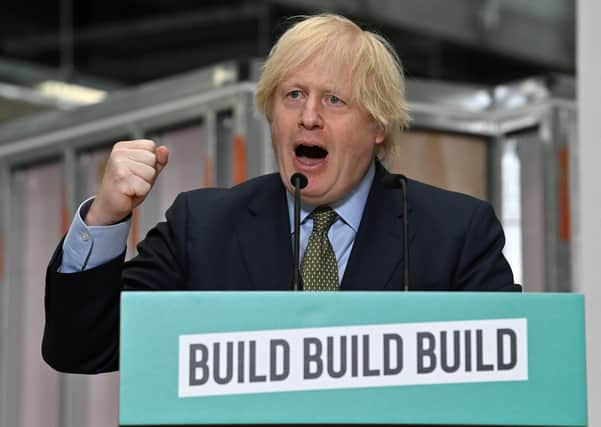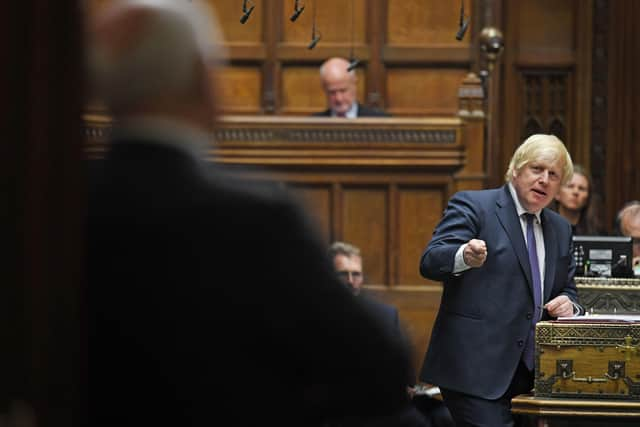Will Boris’s planning bonfire destroy the green agenda? – David Behrens


And Quarry Hill was a Grand Design compared to the 2,500 homes across the city that made up the Hunslet Grange estate. Built in 1968 and demolished after only 15 years, it made a Gulag seem glamorous. The long-gone maisonettes of Hull’s Bransholme development were similarly reviled.
So with those warnings from recent history in mind, how should we view Boris Johnson’s promise this week to ignite the most radical reform to our planning system since the Second World War?
Advertisement
Hide AdAdvertisement
Hide Ad

The PM’s motive in setting light to all the red tape that governs housebuilding is to make it easier for developers to put up homes where people are presumed to want to live. We must build, build, build, he said. I wonder how many games of Scrabble it took Dominic Cummings to string that slogan together.
It isn’t a new idea; it has been in the works since last year and there have been many similar efforts under previous administrations. But the need to rebuild the economy quickly is likely to see the fire take hold this time.
Mr Johnson’s speech was greeted with dismay in some quarters. Clive Betts, the Sheffield MP and chair of the Commons Housing Committee, suggested that it would signal a return to the substandard, ill-planned developments of old. And many environmental groups said it sat uneasily with the need to build more sustainably.
Advertisement
Hide AdAdvertisement
Hide AdEven the Royal Institute of British Architects, whose members were responsible for the most notorious carbuncles of the last century, had the brass neck to say the Government’s aspirations were at odds with its stated ambition to “build more beautifully”.
None of these misgivings is easily dismissed. But, at the same time, the PM’s commitment to empower builders to convert closed-down shops into homes, presents a real opportunity for the wholesale transformation of hundreds of town centres.
The question is whether that is made easier or harder by shifting power from local town halls into the hands of developers whose motivation is their bottom line – not quality and certainly not the environment.
Advertisement
Hide AdAdvertisement
Hide AdAfter all, as Mr Betts pointed out, giving builders free rein may be just a licence to do nothing. In urban and rural communities alike, there are thousands of plots with planning permission for homes that could be built tomorrow but where not so much as a spade has been turned.
Yet if developers have a bad name, so do local authorities. Those projects in Leeds and Hull, before and after the war to which Mr Johnson referred, were led by councils, not builders. And although their planning departments are supposed to ensure that every new development is compliant with regulations and sympathetic with its surroundings, aberrations abound.
It ought to be possible as part of the PM’s supposed “new deal” – a phrase coined by President Franklin Roosevelt at around the time Quarry Hill was being knocked up – to mandate minimum standards for sustainability across the board, in the same way as we do for wiring, drainage and much else. Indeed, on the very day Mr Johnson spoke, one of his own MPs was proposing to the Commons that all new homes be required to have fast broadband, high quality insulation and an electric car charging point. His Bill does not yet have Government support, but Number 10 might be well advised to seize it as a way of pacifying its critics.
Advertisement
Hide AdAdvertisement
Hide AdIt’s important in acknowledging the risks not to lose sight of what we stand to gain here. I have long argued that by turning an old department store into flats, or flattening a parade of abandoned shops to make way for an elegant terrace, urban wastelands could be reborn as vibrant, residential communities – ones with an infrastructure of schools and transport already in place.
This facility to reclaim tired spaces as desirable places in which to live is the holy grail for town centres that are literally dying on their feet. Councils should have realised this years ago and it is their failure to grasp the initiative that will now see their influence diminished – maybe for the better, maybe not.
Editor’s note: first and foremost - and rarely have I written down these words with more sincerity - I hope this finds you well.
Almost certainly you are here because you value the quality and the integrity of the journalism produced by The Yorkshire Post’s journalists - almost all of which live alongside you in Yorkshire, spending the wages they earn with Yorkshire businesses - who last year took this title to the industry watchdog’s Most Trusted Newspaper in Britain accolade.
Advertisement
Hide AdAdvertisement
Hide AdAnd that is why I must make an urgent request of you: as advertising revenue declines, your support becomes evermore crucial to the maintenance of the journalistic standards expected of The Yorkshire Post. If you can, safely, please buy a paper or take up a subscription. We want to continue to make you proud of Yorkshire’s National Newspaper but we are going to need your help.
Postal subscription copies can be ordered by calling 0330 4030066 or by emailing [email protected]. Vouchers, to be exchanged at retail sales outlets - our newsagents need you, too - can be subscribed to by contacting subscriptions on 0330 1235950 or by visiting www.localsubsplus.co.uk where you should select The Yorkshire Post from the list of titles available.
If you want to help right now, download our tablet app from the App / Play Stores. Every contribution you make helps to provide this county with the best regional journalism in the country.
Sincerely. Thank you.
James Mitchinson, Editor
Comment Guidelines
National World encourages reader discussion on our stories. User feedback, insights and back-and-forth exchanges add a rich layer of context to reporting. Please review our Community Guidelines before commenting.